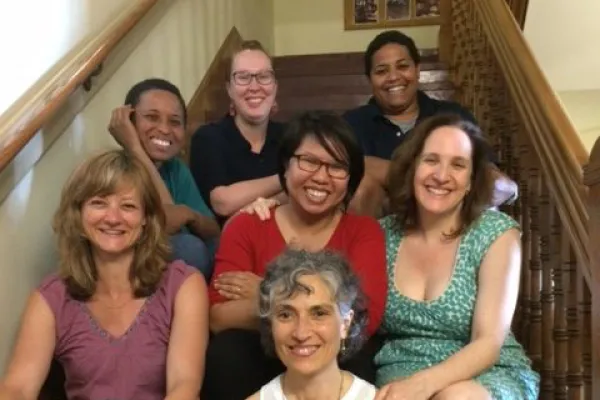History in Action: Students Create Digital Timeline of Domestic Worker Organizing
Campus Life

Published July 11, 2016
Julissa Colón AC ’16 thought she was familiar with the history of the 1955 Montgomery bus boycott. But while researching the protest for a seminar course during her final semester at Smith this spring, she discovered a little-known side to the story.
Colón learned that maids, cooks and other domestic workers in Montgomery were the backbone of the pivotal Civil Rights-era boycott. “They were the leaders of the movement because they were the majority of people riding city buses,” she said.
Colón’s findings on the role of domestic workers in the bus boycott are part of a digital timeline that she and her classmates created for their final project. Their compendium was produced for a real-world client: Matahari Women Workers’ Center, a Boston-based organization that is part of the National Domestic Workers Alliance.
The connection with Matahari came about through Smith’s Steinem Initiative, which aims to make the college’s academic resources more accessible to social justice organizers. Monique Nguyen, executive director of Matahari, attended the Initiative’s inaugural school for organizers last summer, when she toured Smith’s extensive women’s history archives, met faculty and staff, and pitched the idea of a timeline as a needed tool for her group’s organizing.
Nguyen had long dreamed of using a comprehensive historical timeline to strengthen Matahari’s leadership development and organizing. “Domestic workers have traditionally been excluded from labor rights and labor history,” she said. “That’s why seeing ourselves and our work reflected in history—picking up where our sisters before us left off—is so important.”
Jennifer Guglielmo, associate professor of history at Smith, took up the charge with students in her U.S. women’s history seminar. Working with Miriam Neptune, the college’s digital scholarship librarian, students learned how to create an online timeline, then began the hunt for key moments in the history of U.S. domestic workers.
Finding those moments wasn’t easy, said seminar student Martha Neubert, who graduated in May with a master’s degree in teaching from Smith.
“A lot of the information had to be unearthed because it’s just not part of dominant narratives or the official historical record,” said Neubert, who is the new director of multicultural affairs at Northfield Mount Hermon School. “This project was a great way to mine archival materials to better understand the layers of history.”
Whereas Matahari had previously referred to organizing in the 1930s as the start of the narrative of the U.S. domestic workers’ movement, Smith students went farther back, to a seminal 1881 strike by African American washerwomen in Atlanta, Neubert said. The completed timeline reveals how domestic work and the women who perform it have changed over the years—as well as how organizing for better conditions has always been part of the story.
As a librarian, Neptune said she “loved seeing how deeply connected students were to the digital humanities research process.”
“They got excited about finding and using primary sources and became invested in helping their readers uncover more of this important history,” she added.
Among other historical gems, the timeline—which will be available this fall on Matahari’s website—includes:
- A profile of Georgia Gilmore, a cafeteria worker who helped lead the Montgomery bus boycott and founded a club that sold baked goods to support the protest;
- An interactive map of the Bronx “slave markets” of the Great Depression, where women gathered on street corners hoping to be hired for day jobs;
- Stories about the experiences of Native American and immigrant Irish, Latina, Filipina and Japanese domestic workers in the U.S.; and
- Examples of how larger forces such as racism, immigration and the global economy have shaped domestic worker organizing.
Seminar students and faculty are now working with Matahari to make the digital timeline broadly available through open source software. Nguyen hopes students can eventually train frontline organizers to create their own timelines—perhaps through a webinar.
The collaboration with Matahari will continue. Guglielmo and Michelle Joffroy, associate professor of Spanish and Portuguese, will work with the organization in their courses next year to develop the timeline further, translate it into Spanish and create other projects to assist domestic worker organizing efforts. Lisa Armstrong, professor of women and gender studies, will have students research rules covering au pair workers for a future Matahari campaign.
Ada Comstock Scholar Xiomara Jennifer Cooke learned about Matahari last fall in Joffroy’s Doméstica course, where Nguyen was a guest speaker. This summer, Cooke is doing a Praxis internship with the organization, translating oral histories of domestic workers for a new outreach campaign about Massachusetts’ year-old Domestic Workers Bill of Rights.
The project is personal to Cooke, who comes from a family of domestic workers and also has experience doing legal support work in immigrant communities.
“People often negate the value of these unseen people and the bravery they exhibit,” Cooke said. “But domestic workers are part of the economic machinery of this country. I carry that legacy with me.”
Clockwise from left: Smith Professor Lisa Armstrong, Digital Scholarship Librarian Miriam Neptune, Julissa Colon AC '14, Martha Neubert M.A.T. '16, Professors Jennifer Guglielmo and Michelle Joffroy, and Matahari Director Monique Nguyen (center)